Vasily Chuikov
Vasily Ivanovich Chuikov (Russian: Васи́лий Ива́нович Чуйко́в; ![]() listen ; 12 February [O.S. 31 January] 1900 – 18 March 1982) was a Soviet military commander and Marshal of the Soviet Union. He is best known for commanding the 62nd Army which saw heavy combat during the Battle of Stalingrad in the Second World War.
listen ; 12 February [O.S. 31 January] 1900 – 18 March 1982) was a Soviet military commander and Marshal of the Soviet Union. He is best known for commanding the 62nd Army which saw heavy combat during the Battle of Stalingrad in the Second World War.
Vasily Ivanovich Chuikov | |
|---|---|
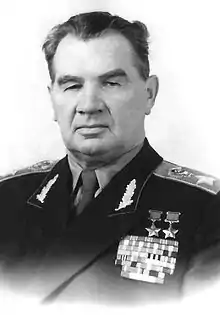 | |
| Native name | Василий Иванович Чуйков |
| Nickname(s) | "The Man of Iron Will" "The Stone" |
| Born | 12 February 1900 Serebryanye Prudy, Tula Governorate, Russian Empire |
| Died | 18 March 1982 (aged 82) Moscow, Russian SFSR, Soviet Union |
| Place of burial | |
| Allegiance | |
| Years of service | 1917–1972 |
| Rank | |
| Commands held | 4th Army 64th Army 62nd Army 8th Guards Army Group of Soviet Forces in Germany Kiev Military District |
| Battles/wars | Russian Civil War |
| Awards | Twice Hero of the Soviet Union Distinguished Service Cross (United States) |
| Other work | 1961 until his death, he was a member of the Central Committee of the Communist Party of the Soviet Union |
Born to a peasant family near Tula, Chuikov earned his living as a factory worker from the age of 12. After the Russian Revolution of 1917, he joined the Red Army and distinguished himself during the Russian Civil War. After graduating from the Frunze Military Academy, Chuikov worked as a military attaché and intelligence officer in China and the Russian Far East. At the outbreak of the Second World War, Chuikov commanded the 4th Army during the Soviet invasion of Poland, and the 9th Army during the Winter War against Finland. In December 1940, he was again appointed military attaché to China in support of Chiang Kai-shek and the Nationalists in the war against Japan.
In March 1942, Chuikov was recalled from China to command the 62nd Army in defense of Stalingrad. Tasked with holding the city at all costs, Chuikov adopted the hugging tactic, keeping the Soviet front-line positions as close to the Germans as physically possible. This served as an effective countermeasure against the Wehrmacht's combined-arms tactics, but by mid-November 1942 the Germans had captured most of the city after months of slow advance. In late November Chuikov's 62nd Army joined the rest of the Soviet forces in a counter-offensive, which led to the surrender of the German army in early 1943. After Stalingrad, Chuikov led his forces into Poland during Operation Bagration and the Vistula–Oder Offensive before advancing on Berlin. He personally accepted the unconditional surrender of German forces in Berlin on 2 May 1945.
After the war, Chuikov served as Chief of the Group of Soviet Forces in Germany (1949–53), commander of the Kiev Military District (1953–60), Chief of the Soviet Armed Forces and Deputy Minister of Defense (1960–64), and head of the Soviet Civil Defense Forces (1961–72). Chuikov was twice awarded the titles Hero of the Soviet Union (1944 and 1945) and was awarded the Distinguished Service Cross by the United States for his actions during the Battle of Stalingrad. In 1955, he was named a Marshal of the Soviet Union. Following his death in 1982, Chuikov was interred at the Stalingrad memorial at Mamayev Kurgan, which had been the site of heavy fighting.
Early life
Born into a peasant family in the village of Serebryanye Prudy in the Tula region south of Moscow, Chuikov was the eighth of 12 children and the fifth of eight sons. At the age of 12, he left school and his family home to earn his living in a factory in Saint Petersburg, turning out spurs for cavalry officers.[1] Chuikov and all his brothers became soldiers and fought in the Russian Civil War.[2]
Russian Revolution and Civil War
During the turmoil of the Russian Revolution of 1917, Chuikov became unemployed. Later the same year, an older brother arranged for Chuikov to be recruited into the Red Guards. The year after, in 1918, he joined the Red Army.[1]
In October 1918, Chuikov saw active service when he was sent to the Southern Front as a deputy company commander to fight against the White Army. In the spring of 1919, he became commander of the 40th Regiment (later renamed the 43rd), part of the 5th Army under Tukhachevsky facing the White Army under Kolchak in Siberia.[3]
Chuikov's record of service during the Civil War was distinguished. In the fighting from 1919 to 1920 he received two awards of the Order of the Red Banner for bravery and heroism. He was wounded four times—one, in Poland in 1920, left a fragment in his left arm that could not be operated on. It led to partial paralysis and caused him to lose use of his arm temporarily. Chuikov carried this war wound for the rest of his life, and it eventually led to septicaemia breaking out in 1981, causing a nine-month illness and finally his death.[4]
Inter-war period
He left his regiment in 1921 to continue his studies at the Frunze Military Academy, from which he graduated in 1925.[4] On account of his excellent academic performance, Chuikov was invited to stay at the Frunze Military Academy for another year to study Chinese language and history in the Orient Studies Department.[5] In the fall of 1926, Chuikov joined a Soviet diplomatic delegation that toured Harbin, Changchun, Port Arthur, Dalian, Tianjin and Beijing, cities in northeastern and northern China.[5] After completing his studies in the fall of 1927, Chuikov was dispatched to China as a military attaché.[5] Chuikov traveled extensively in southern China and Sichuan, became fluent in Chinese, and gained a deeper understanding of Chinese politics and culture.[5][6] In 1929, during the China Eastern Railway Incident, Chuikov was forced to leave China after the Soviet Union broke diplomatic relations with the Republic of China on 13 July. Chuikov was assigned to the newly formed Special Red Banner Far Eastern Army in Khabarovsk and worked on military intelligence, reporting to Vasily Blyukher, the commander of the Far Eastern Army.[5] The Soviet Far Eastern Army defeated the Northeastern Army of Zhang Xueliang, and Chuikov participated in negotiations that restored Soviet control of the China Eastern Railway.[6]
Early Second World War, Finnish War and China (1939–1942)
Chuikov commanded the 4th Army in the Soviet invasion of Poland in 1939. He commanded the 9th Army in the Russo-Finnish War of 1940.
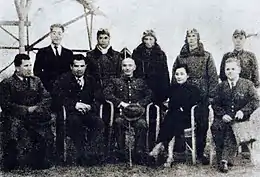
In December 1940, Chuikov was appointed the chief Soviet military representative to the Republic of China and adviser to Chiang Kai-shek, the Nationalist leader, in Chongqing. Prior to his departure for China, he was summoned to meet Joseph Stalin and Semyon Timoshenko, who instructed him to ensure that China remain engaged in the war with Japan so Japan could not challenge the Soviet Union in the Far East and allow the Soviet Union to focus on the German threat from the West.[7] Stalin told Chuikov to prioritize support for Nationalists over the Chinese Communists so as to ensure Chinese unity against Japan.[7] Chuikov arrived in China with a large supply of Soviet armaments for the Nationalist Army, including tanks, artillery, fighter and bomber aircraft, and trucks.[8] In January 1941 when the Nationalists attacked the Communists in the Southern Anhui Incident in breach of their nominal alliance, Chuikov was criticized by Mao Zedong for failing to stop Chiang's aggression against the Chinese Communists.[9] Chuikov insisted that the Nationalists could not use Soviet weaponry against the Communists, met with Communist leaders Zhou Enlai and Ye Jianying, but in keeping with Stalin's directives, continued to support the Nationalist war effort against Japan, even after the signing of the Soviet–Japanese Neutrality Pact in April 1941. In the Second Battle of Changsha in September 1941, he advised Chiang to relieve the Japanese siege on Changsha by attacking the strategic city of Yichang some 400 km to the north, and the strategy succeeded.[10] In March 1942, he was recalled to the USSR, which by then was at war with Germany.[8]
Stalingrad (1942–1943)
Chuikov was placed in command of the 64th Army, a reserve unit in Tula that was sent to the west of the Don River in August to block Hermann Hoth's 4th Panzer Army south of Stalingrad. This defensive stand allowed the remnants of the 62nd Army to break encirclement west of Kalach and escape over the Don River. On 30 July, Vasily Gordov, commander of the Stalingrad Front, replaced Chuikov as commander of the 64th Army with Mikhail Shumilov.[11] In September, Chuikov was placed in command of the remains of the 62nd Army, reinforced with the shattered remnants of the 1st Tank Army, to defend the city of Stalingrad itself.
Upon being given his orders, Chuikov was asked by Nikita Khrushchev, the political commissar, and Andrey Yeryomenko, the commander of the Southeastern Front, of his thoughts. To which he replied, "I understand my orders just fine, and I’ll carry them out. I’ll do what I can. I’ll either keep them out of Stalingrad or die trying."[12]
He placed his command posts on the west bank of the Volga and stayed there throughout the battle. He strictly enforced Stalin's "not one step back" order. In an interview during the later phase of the battle on 5 January 1943 from his headquarters near the Red October steelworks, Chuikov told Soviet war correspondent A. A. Belkin that early in the battle, he had summarily executed several officers and commissars for cowardice.[12]
To be honest, most of the divisional commanders didn’t really want to die in Stalingrad. The second something went wrong, they’d start saying: 'Permit me to cross the Volga.' I would yell 'I’m still here' and send a telegram: 'One step back and I’ll shoot you!'[12]
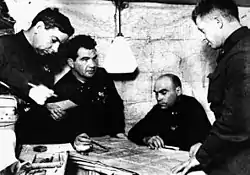
The determination that Chuikov instilled in his men enabled the 62nd Army to defend the city against all odds.
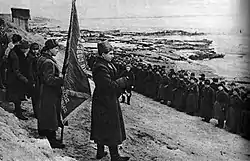
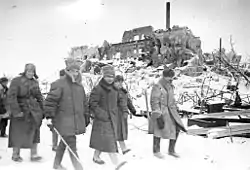
Stalingrad will decide the fate of the motherland. The men understood this. The men were in such a mood that if they’d been wounded, even with a broken spine, they had tears in their eyes as they were being taken to the east bank. They’d say to their comrades who had brought them out: I don’t want to go. Better to be buried here. They considered it shameful to go wounded to the other bank.[12]
Chuikov was concerned about maintaining communications with his troops.
We moved to another command post closer to where the enemy would be attacking. And we stayed there. We knew that every extra meter of telephone wires increased the risk of our communications being broken. The most criminal, most dangerous thing for a commander, especially a senior commander, is when you lose control and communications. Most of all, we were afraid of losing control of our troops. I may not be able to send one of my commanders any reinforcements, but it’s enough for me to grab the phone and say the right thing, that’s all he needs.[12]
It was at Stalingrad that Chuikov developed the important tactic of "hugging the enemy", by which Soviet soldiers kept the German army so close to them as to minimize the airpower enjoyed by the Wehrmacht. Chuikov had witnessed firsthand the blitzkrieg tactics the Wehrmacht had used to sweep across the Russian steppe, so he used the Germans' carpet-bombing of the city to draw panzer units into the rubble and chaos, where their progress was impeded. Here they could be destroyed with Molotov cocktails, antitank rifles, and Soviet artillery operating at close range. This tactic also rendered the Luftwaffe ineffective, since Stuka dive-bombers could not attack Red Army positions without endangering their own forces.[13][14]
[O]ur soldiers knew that the closer they were to the enemy, the better. They stopped being afraid of tanks. The infantrymen would get in a trench, ravine, or building, and start shooting the enemy infantry who were advancing behind the tanks. The tanks would move through, and we’d leave them to our artillery, which was two to three hundred meters back from the front lines and would fire when they came within twenty to fifty meters. And we didn’t let their infantry through. The Germans would think that this area was already cleared, that it was dead ground. But that dead ground came back to life.[12]
The fierce defense of Stalingrad by the 62nd Army slowed the German advance and forced Axis forces to pull units from the flanks outside the city to reinforce the urban assault. By mid-November, German forces had taken most of the city and pinned Chuikov and the remaining defenders in several small pockets against the Volga River. In interviews in 1943, Chuikov said he was not informed of the Operation Uranus counter-offensive but could sense one was being planned.
We had sensed that our high command was preparing a major attack, but we didn’t know where exactly. We had sensed this from the very beginning of November. We were being given less and less help. We’d been used to talking to people from front HQ every day, but now they’d all vanished. Khrushchev wasn’t here, and Yeryomenko came only once...
According to the British historian Antony Beevor, Chuikov felt bitter and betrayed that the he had not been told by the Soviet High Command that his forces in the city were used as a bait and had only been given enough reinforcements to hold on but not enough forces to win the battle within the city.[15] All spare reserves were being devoted to the counter-attack.
On 19 November 1942, Soviet forces launched a massive double pincer attack to the north and south of Stalingrad, exploiting the weakened Axis flanks and encircling the German Sixth Army, part of the Fourth Army and the Romanian Third and Fourth Armies in a vast pocket stretching nearly 80 km from Stalingrad to Kalach-on-Don. On 22 November, Chuikov's 62nd Army switched to an offensive posture, counter-attacking to recapture neighborhoods and preventing German forces from leaving the city to fight elsewhere in the pocket. The German Sixth Army surrendered on 31 January 1943.
Later Second World War (Poland and Germany 1943–1945)
After the victory at Stalingrad, the 62nd Army was redesignated the Soviet 8th Guards Army. Chuikov then commanded the 8th Guards as part of 1st Belorussian Front and led its advance through Poland. During the Vistula-Oder offensive, the troops of the 8th Guards under Chuikov participated in breaking the enemy's defense in depth, and liberated Majdanek concentration camp on the outskirts of the Polish city of Lublin. The 8th Guards liberated the city of Łódź, seized the fortress city of Poznan by storm, seized a bridgehead on the left bank of the Oder River and fought for two months to maintain and expand the bridgehead in the Kustrin area, before finally heading the Soviet offensive which conquered Berlin while the Western Allied forces were wiping out what was left in Southern and Western Germany in April/May 1945.
Chuikov's advance through Poland was characterized by massive advances across difficult terrain [on several occasions, the 8th Guards Army advanced over 40 miles (64 km) in a single day]. On 1 May 1945, Chuikov, who commanded his army operating in central Berlin, was the first Allied officer to learn about Adolf Hitler's suicide, being informed by General Hans Krebs who had come to Chuikov's headquarters under a white flag. Krebs, under orders from Goebbels, sought conditions for surrender more favorable to the Germans, which Chuikov had no authority to grant and so rejected any terms. On 2 May, he accepted the unconditional surrender of Berlin's forces from General Helmuth Weidling who had taken command, with the suicide that morning by Gen. Krebs.
Chuikov appeared in the documentary film Berlin (1945), directed by Yuli Raizman.
Later life
After the war, Chuikov continued to command the 8th Guards Army in Germany, later serving as Commander-in-Chief of the Group of Soviet Forces in Germany from 1949 until 1953, when he was made commander of the Kiev Military District. While serving at that post, on 11 March 1955 he was promoted to Marshal of the Soviet Union. From 1960 to 1964, he was the Commander-in-Chief of the Soviet Ground Forces. He also served as the Chief of the Civil Defense from 1961 until his retirement in 1972. From 1961 until his death, he was a member of the Central Committee of the Communist Party of the Soviet Union. In 1969, Chuikov led the Soviet delegation attending the funeral of Dwight D. Eisenhower.[16]
He was a major consultant for the design of the Stalingrad battle memorial on Mamayev Kurgan, and was buried there after his death at the age of 82.
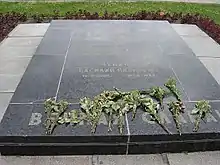
Memoirs in translation
- The Beginning of the Road: The Story of the Battle for Stalingrad, London, 1963.[17]
- Chuikov, Vasili (2003). Mission to China: Memoirs of a Soviet Military Adviser to Chiang Kaishek. Translated by Barrett, David P. Eastbridge. ISBN 978-1-891936-10-4.
- Chuikov, Vasili (1978). The End of the Third Reich. Moscow: Progress. ISBN 978-0-8285-0453-9.
In popular culture
- Soviet epic war film The Battle of Stalingrad (1949), played by Nikolay Simonov
- Soviet epic war film The Fall of Berlin (1949), played by Boris Tenin
- Soviet-Polish-East German-Italian-Yugoslav epic war film series Liberation (1970–1971), played by Ivan Pereverzev
- Soviet-East German-Czechoslovak-American epic war film Stalingrad (1989), played by Powers Boothe
- Russian biopic/docudrama The Great Commander Georgy Zhukov (1995), played by Mikhail Ulyanov
- Chuikov was briefly featured in the 2004 German-Austrian movie Downfall (Der Untergang), dealing with the fall of Berlin in 1945. He was portrayed by Russian actor Aleksandr Slastin.
- Russian 16-part film series Zhukov (2012), played by Igor Artashonov
Honours and awards
- Soviet Union
- Foreign
| Patriotic Order of Merit in gold, twice (East Germany) | |
| Grand Star of the Star of People's Friendship (East Germany) | |
| Order of Sukhbaatar (Mongolian People's Republic) | |
| Medal "For Victory over Japan" (Mongolian People's Republic) | |
| Medal "30 year anniversary of the Victory over Japan" (Mongolian People's Republic) | |
| Medal "30 year anniversary of the Battle of Khalkhin Gol" (Mongolian People's Republic) | |
| Medal "40 year anniversary of the Battle of Khalkhin Gol" (Mongolian People's Republic) | |
| Medal "50 years of the Mongolian People's Republic" (Mongolian People's Republic) | |
| Medal "50 years of the Mongolian People's Army" (Mongolian People's Republic) | |
| Grand Cross of the Virtuti Militari (Poland) | |
| Commander's Cross of the Polonia Restituta, (Poland) | |
| Cross of Grunwald, 2nd class (Poland) | |
| Medal "For Warsaw 1939–1945" (Poland) | |
| Medal "For Oder, Neisse and the Baltic" (Poland) | |
| Order of the Cloud and Banner with Special Grand Cordon (Republic of China) | |
| Medal of Sino-Soviet Friendship (China) | |
| Distinguished Service Cross (United States) | |
References
- Jones, p.73
- Jones, p.72
- Jones, p. 74
- Jones, p. 75
- 中东路事件孙中山苏联顾问率苏军大败张学良 [Soviet Advisor to Sun Yat-sen lead Soviet Military of defeat Zhang Xueliang]. China.com (in Chinese). 24 May 2013 [2010].
- 苏联二战名将曾警告蒋介石反内战 结交中共将领 [Famous Soviet World War II General Warned Chiang Kai-shek Against Civil War, Met Chinese Communist Commanders]. Chinanews.com (in Chinese). 30 April 2015.
- Dieter Heinzig, The Soviet Union and Communist China, 1945-1950: The Arduous Road to the Alliance, M.E. Sharpe, 2004 pg. 21
- 苏联名将崔可夫的中国情缘:曾长期作为国军顾问 [Famed Soviet General Chuikov's China Connection: Long-Time Military Advisor]. Qiushi.com (in Chinese). 29 July 2015 [2015].
- Jin Dianqiang 金点强 (21 August 2007) [2007]. 皖南事变时苏军顾问失职内幕 [The Dereliction of Duty of Soviet Advisors in the Southern Anhui Incident]. People.com.cn (in Chinese).
- 没有这个外国元帅,薛岳第二次长沙会战,可能不会取得如此大胜 [Without this Foreign Marshall, Xue Yue Might Not Have Achieved the Great Victory in the Second Battle of Changsha]. Sohu.com (in Chinese). 8 September 2018.
- https://www.youtube.com/watch?v=n1DeU6NckLM&feature=youtu.be&t=1646&ab_channel=TIK
- V. Chuikov, "The Stalingrad Transcripts" (interviews on 5 January 1943, and February or March 1943) in Nine Accounts of the War Accessed 2020-07-17
- Craig, William (1973). Enemy at the Gates: the Battle for Stalingrad. New York: Penguin Books, ISBN 0-14-200000-0, pp. 90, 91
- Beevor, Antony (1998). Stalingrad. New York: Viking, ISBN 0-14-024985-0, pp. 128, 129
- "Chuikov", Interview of Antony Beevor in WW2History.com
- Vasily I. Chuikov Dies, Washington Post 1982-03-20
- Keegan, John. The Battle for History: Re-fighting World War Two (Barbara Frum lecture series), Vintage Canada, Toronto, 1995. Republished by Vintage Books, New York, 1996, p. 121
Bibliography
- Jones, Michael K. (2010). Stalingrad: How the Red Army Triumphed. UK: Pen & Sword Books. ISBN 978-1-84884-201-4.
External links
| Wikiquote has quotations related to: Vasily Chuikov |
| Wikimedia Commons has media related to Vasily Chuikov. |
- (in Russian) Memoirs by Vasili Chuikov: Сражение века Battle of the Century – Describes his experiences during the Battle of Stalingrad.
- (in Russian) Memoirs by Vasili Chuikov: Конец третьего рейха The End of the Third Reich – Describes his experiences during the last months of the war, ending with the Battle of Berlin.
- (in Russian) Biography on the website dedicated to the Heroes of the Soviet Union/Russia.
- Newspaper clippings about Vasily Chuikov in the 20th Century Press Archives of the ZBW